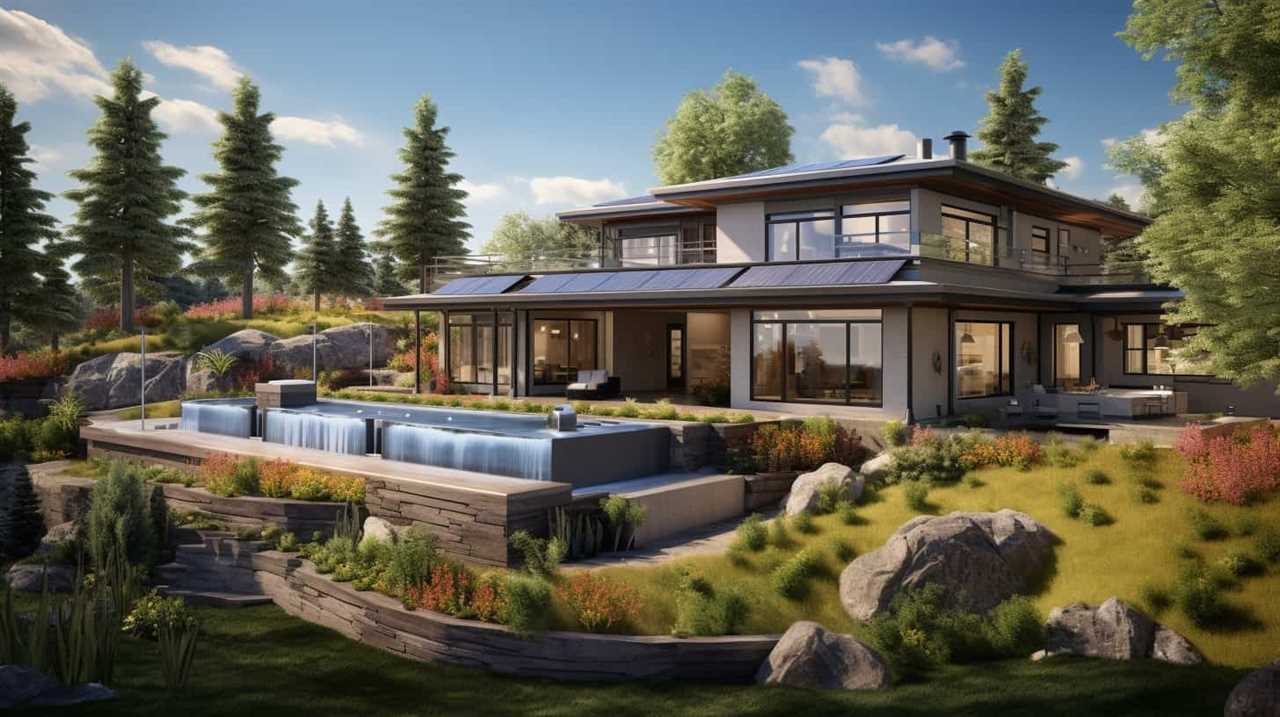Prepare to transform your HVAC system using the benefits of eco-friendly technology.
In our article, we will delve into the world of heat pumps and uncover the secrets to mastering energy efficiency.
Discover how these innovative systems can save you money while reducing your carbon footprint.
With our expert guidance, you’ll learn how to optimize heat pump performance for maximum energy savings.
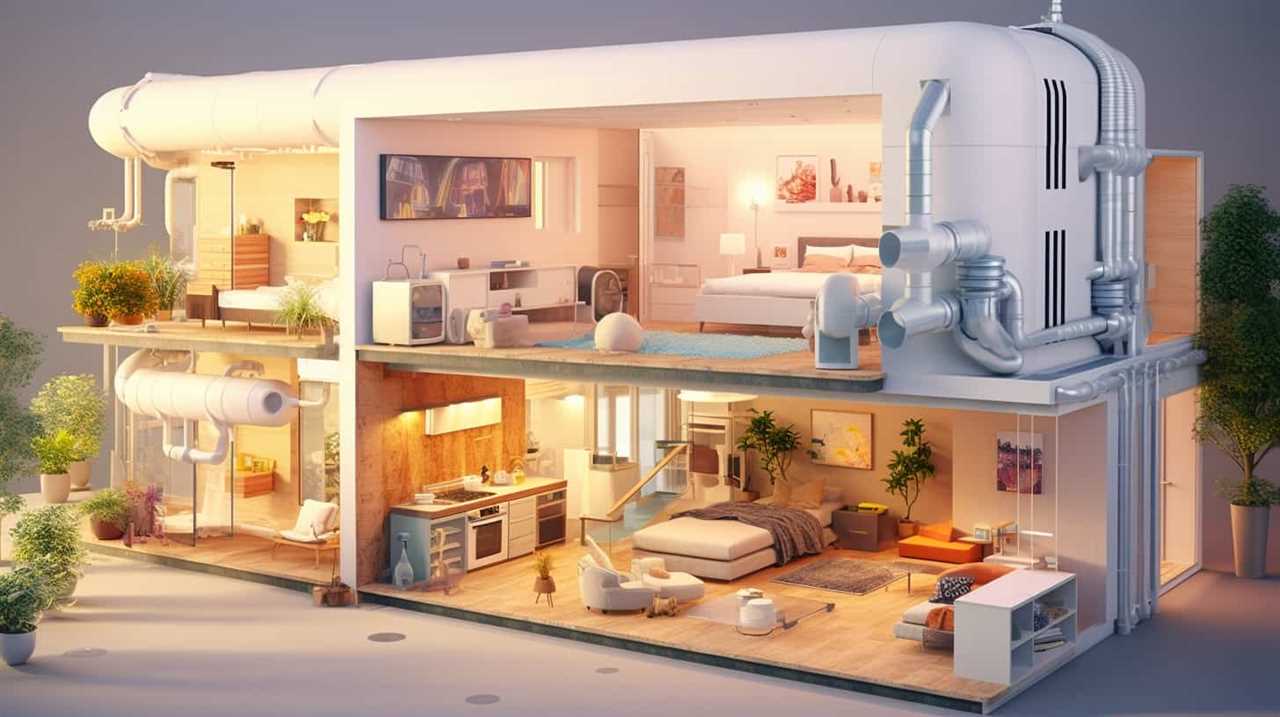
Join us on this journey towards a greener, more sustainable future.
Let’s unlock the potential of green HVAC together.
Key Takeaways
- Heat pumps provide both heating and cooling by transferring heat from one area to another.
- Energy efficiency ratings for heat pumps are expressed as SEER and HSPF.
- Green heat pump systems offer significant cost savings and have a positive environmental impact.
- Regular maintenance and optimization measures can help maximize heat pump performance and energy savings.
The Basics of Heat Pump Technology
First, let’s delve into the basics of heat pump technology. Heat pumps are highly efficient HVAC systems that provide both heating and cooling for your home. They work by transferring heat from one area to another, rather than generating heat or cold air like traditional HVAC systems.
In the winter, heat pumps extract heat from the outside air and transfer it indoors, while in the summer, they remove heat from inside and release it outside. This process is known as heat pump operation.
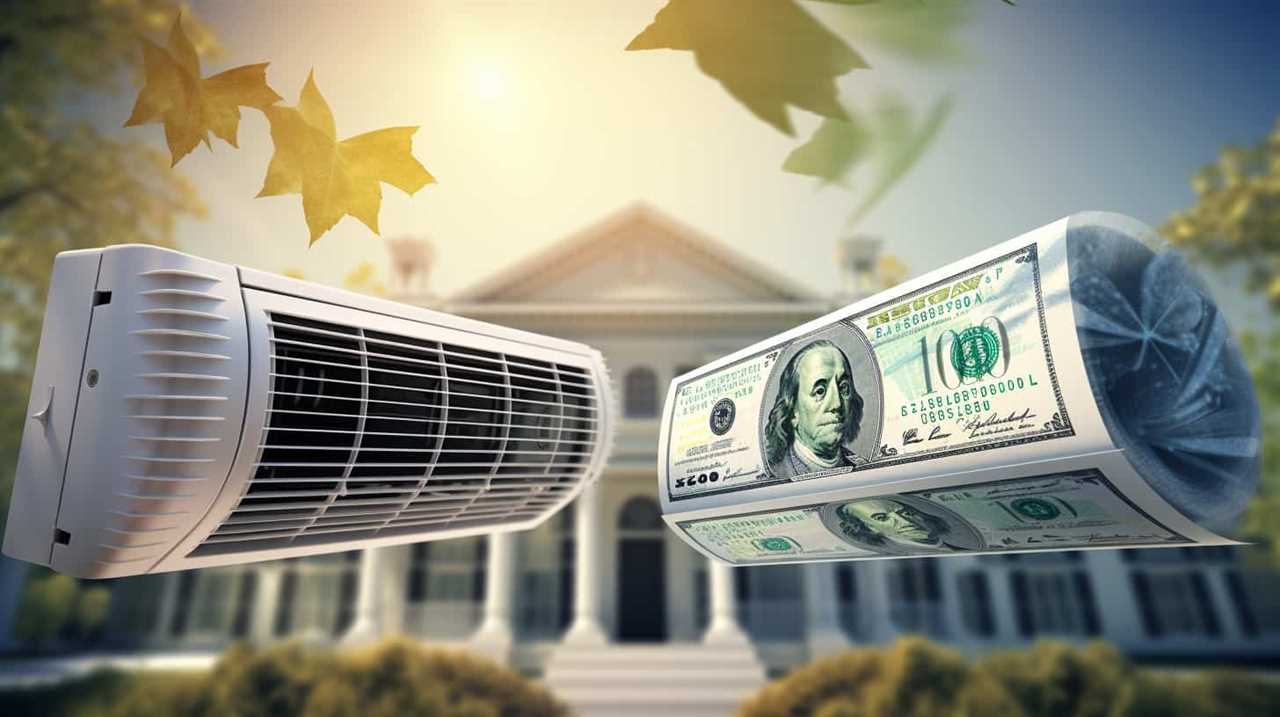
To keep your heat pump running smoothly, regular maintenance is essential. This includes cleaning or replacing air filters, inspecting and cleaning coils, and lubricating moving parts. Proper heat pump maintenance ensures optimal performance and extends the lifespan of your system.
Now, let’s move on to understanding energy efficiency ratings for heat pumps.
Understanding Energy Efficiency Ratings for Heat Pumps
Now, let’s take a closer look at how energy efficiency ratings for heat pumps can help us maximize our HVAC system’s performance.
Heat pump efficiency standards are used to measure the energy efficiency of a heat pump system. These ratings are typically expressed as a Seasonal Energy Efficiency Ratio (SEER) or a Heating Seasonal Performance Factor (HSPF).
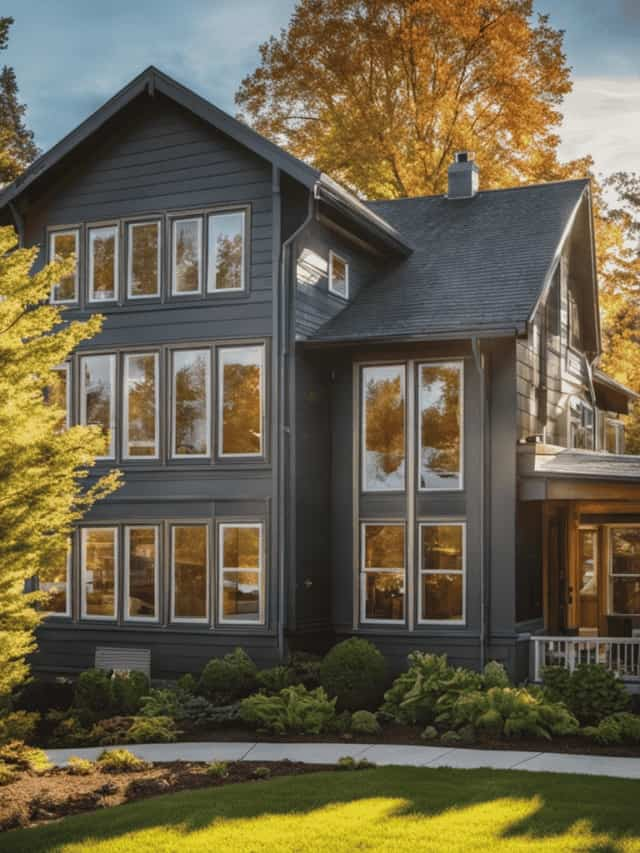
SEER measures the cooling efficiency of the heat pump, while HSPF measures its heating efficiency. By comparing heat pump ratings, we can determine which systems are more energy efficient and can provide better performance.
Higher SEER and HSPF ratings indicate greater energy efficiency and lower operating costs. It’s important to note that heat pump efficiency ratings can vary depending on the climate and region, so it’s essential to consider local conditions when comparing ratings.
Ultimately, understanding these energy efficiency ratings can help us make informed decisions and choose the most efficient heat pump for our HVAC system.
Benefits of Green Heat Pump Systems in HVAC
We can enjoy numerous benefits by incorporating green heat pump systems into our HVAC. Not only do these systems offer significant cost savings, but they also have a positive environmental impact. Green heat pump systems are highly energy-efficient, resulting in lower energy consumption and reduced utility bills. By using renewable energy sources, such as geothermal or air-source heat pumps, we can decrease our reliance on fossil fuels and reduce greenhouse gas emissions. This not only helps to combat climate change but also improves the air quality in our communities. Furthermore, green heat pump systems are quiet, require minimal maintenance, and have a longer lifespan compared to traditional HVAC systems. Overall, investing in green heat pump systems is a win-win solution for both our wallets and the planet.
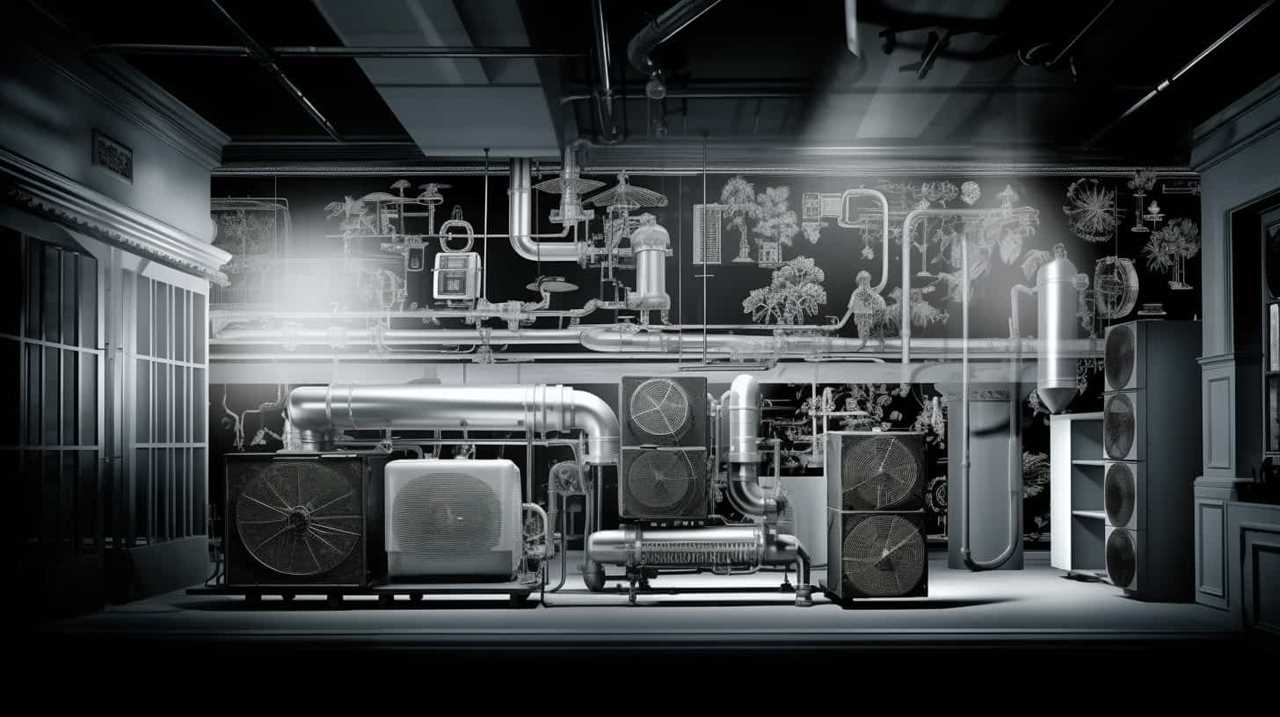
| Benefits | Description |
|---|---|
| Cost Savings | Lower utility bills and reduced energy consumption |
| Environmental Impact | Decreased reliance on fossil fuels, reduced greenhouse gas emissions |
Optimizing Heat Pump Performance for Energy Savings
To maximize energy savings, we can optimize the performance of our heat pumps through proper maintenance and regular system inspections. By implementing these energy-saving strategies, we can ensure that our heat pumps operate at their highest efficiency levels, reducing our energy consumption and costs.
Here are some key steps to optimize heat pump performance:
- Regularly clean and replace air filters to maintain proper airflow and prevent strain on the system.
- Schedule annual professional maintenance to check refrigerant levels, inspect components, and identify any potential issues.
- Keep the outdoor unit clear of debris and vegetation to allow for proper airflow.
- Set the thermostat to the most energy-efficient temperature for your comfort.
- Consider upgrading to a programmable thermostat to optimize energy usage based on your schedule.
- Insulate ductwork to minimize heat loss or gain during air distribution.
Green HVAC: Implementing Heat Pump Solutions for Energy Efficiency
Implementing heat pump solutions is essential for achieving energy efficiency in our HVAC systems. Heat pumps are an eco-friendly alternative to traditional heating and cooling systems, as they extract heat from the air or ground and transfer it indoors. This process requires less energy than generating heat or cool air from scratch, resulting in significant energy savings. To fully harness the benefits of heat pumps, proper installation and regular maintenance are crucial. Professional heat pump installation ensures optimal performance and efficiency, while routine maintenance prevents potential issues and prolongs the lifespan of the system. By investing in heat pump solutions and prioritizing their maintenance, we can reduce our carbon footprint and contribute to a greener future for our planet.
| Benefits of Heat Pump Solutions | ||
|---|---|---|
| Energy Efficiency | Cost Savings | Environmental Impact |
| Reliable Heating and Cooling | Longevity | Improved Air Quality |
| Reduced Carbon Footprint | Enhanced Comfort | Lower Energy Bills |
| Sustainable Solution | Increased Home Value | Noise Reduction |
Frequently Asked Questions
Are Heat Pumps Suitable for All Types of Homes and Buildings?
Yes, heat pumps are suitable for all types of homes and buildings. When considering heat pump installation, it is important to factor in the specific needs of the space and the benefits of heat pumps in cold climates.

How Much Does It Cost to Install a Green Heat Pump System?
Installing a green heat pump system can vary in cost, but the overall investment is worth it. The cost breakdown includes equipment, installation, and any necessary modifications. We can provide a detailed analysis to help you determine the return on investment.
Can Heat Pumps Be Used for Both Heating and Cooling Purposes?
Yes, heat pumps can be used for both heating and cooling purposes. They utilize heat pump technology to transfer heat from one place to another, providing energy-efficient heating and cooling solutions. The benefits of using heat pumps include lower energy consumption and reduced environmental impact.
Are Heat Pumps Noisy When in Operation?
Heat pumps can be noisy when in operation, but regular heat pump maintenance and noise reduction techniques can help minimize the noise. We’ve found that these strategies are essential for achieving a quieter and more efficient HVAC system.
Are There Any Government Incentives or Rebates Available for Installing Green Heat Pump Systems?
Yes, there are government incentives and rebates available for installing green heat pump systems. These incentives promote heat pump efficiency and help make the transition to more energy-efficient HVAC systems more affordable for homeowners.
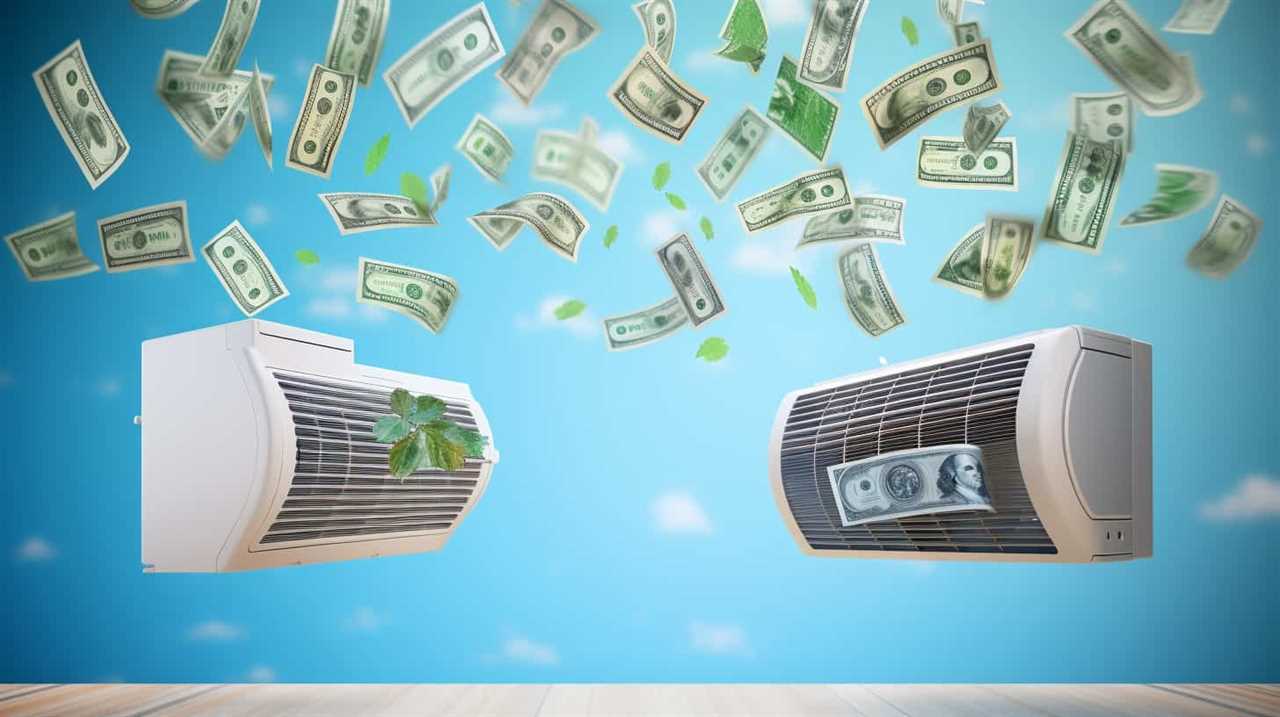
Conclusion
In conclusion, heat pump systems offer a highly efficient solution for heating and cooling in HVAC systems.
By harnessing renewable energy sources, these green heat pump systems not only reduce energy consumption but also contribute to a cleaner environment.
With their impressive energy efficiency ratings and ability to optimize performance, heat pumps are the perfect choice for those seeking to master energy efficiency in their HVAC systems.
Embrace the power of heat pumps and witness a revolution in green HVAC technology!
